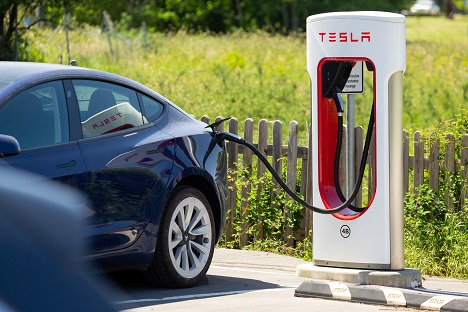In February 2021, I called MicroStrategy (Nasdaq: MSTR) the biggest short in the market. That day, the stock closed at $876. As I write, it sits at $206 – a decline of more than 75%. And at its low of this year, in May, it had fallen to $134. That’s a stunning drop of 85%.
I was bearish because of MicroStrategy’s leadership – namely, its CEO. Now it turns out he’s being charged with tax fraud in Washington, D.C.
I believe Tesla (Nasdaq: TSLA) is another great short for some similar, as well as different, reasons.
Tesla makes great cars. I drive a Model 3. I’ve never been a car guy, but I LOVE my car. It looks great and runs great, and the only reason I know what gas costs is because it’s my job to keep track of those things.
However, I can’t say I’m as thrilled with Tesla’s business as I am with its shiny cars.
After years of losses, the company finally turned profitable in 2020. But here’s something you won’t hear the Tesla bulls discussing…
Tesla’s cash cow isn’t its cars. It’s carbon credits.
Companies are granted carbon credits for reducing their carbon output. Electric vehicle (EV) makers like Tesla earn lots of carbon credits because EVs don’t pollute like gas-powered cars do. These credits can be traded and sold to other companies that are up against their carbon output limits, allowing said companies to pump out more carbon.
So Tesla sells carbon credits to companies like General Motors (NYSE: GM) that are putting out more carbon into the environment. And it makes a profit doing so.
Last year, Tesla made $1.5 billion selling carbon credits, something the company disclosed only when forced to by the Securities and Exchange Commission (SEC).
That number is declining. In the second quarter of 2022, revenue from carbon offsets was cut in half.
Tesla’s $68 million profit from selling some of its Bitcoin holdings also added to the second quarter’s bottom-line numbers.
So a meaningful amount of Tesla’s revenue comes from non-car-related activities, the largest of which being carbon offsets, which are declining.
But the most significant aspect of my bearish thesis on Tesla is the company’s founder and CEO, Elon Musk.
The man is brilliant and created a fantastic product. He changed the game. But he’s become distracted, and, frankly, he doesn’t run a good business.
And running a successful international business is hard. It’s even tougher when you’re spending time blasting off into space, making bids for unrelated businesses (Twitter) and getting embroiled in lawsuits with them. One might say you’re not focused on your car company.
Musk’s outspoken, abrasive and impulsive personality has gotten him in trouble with the SEC before, like when he tweeted that he was considering taking Tesla private at $420 and that funding was secured. He was joking. Somehow, the usually jovial folks at the SEC didn’t see the humor.
And Musk’s behavior, such as lashing out at the Federal Aviation Administration for delaying the launch of one of his rocket ships due to safety issues, has turned him into a James Bond villain to some people. And some of those people are his customers, who may stop supporting him.
For years, Tesla was really the only game in town when it came to EVs. Today, buyers have more choices, and some of the new EVs, like those made by Lucid, are gorgeous, fast and fun to drive. Tesla has more competition than it did in the past, and it has a CEO who may be alienating a portion of its customers and whose eye may not be on the ball.
Tesla has also made headlines for mistreating employees. Charges of harassment, discrimination and forcing people to work without being paid for overtime have caught the attention of not only the media but also institutional investors.
That brings me to the last point in my bearish thesis on Tesla: The stock is priced for perfection.
Tesla trades at 66 times earnings, with around 85% earnings growth expected in 2022 and 36% forecast in 2023. Those are high bars to clear. Any shortfall could send the stock plummeting.
Tesla’s cars are fantastic. The CEO is brilliant. But Tesla doesn’t make as much money from its actual products as it would like you to believe. Furthermore, Elon Musk is becoming more and more of a wild card as the weeks go by.
I believe Tesla could fall to $150 in the next 12 to 24 months.
